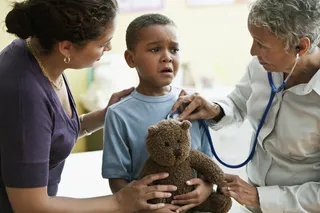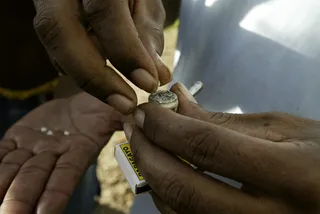Health Rewind: HIV Infections Down 33 Percent Worldwide
Plus, how racism affects children's mental health.

1 / 10
Global New HIV Infections Decreased by a Third Since 2001 - The United Nations declared in a new annual report that the world has made "enormous progress" in the fight against AIDS, USA Today reported. New infections are down by 33 percent worldwide since 2001 thanks to increased funding and getting more HIV-positive people on medication. (Photo: Brendan Smialowski/Getty Images)

2 / 10
Black Children Less Likely to Be Given Pain Killers in the ER - A new study suggests that Black children taken to the ER for stomach cramps and pain were 39 percent less likely to be given an over-the-counter painkiller such as Tylenol and 69 percent less likely to be given a prescribed painkiller compared to white kids. Researchers blame doctors’ subconscious racism and the chaos of the ER for this disparity, Reuters wrote.(Photo: KidStock/Getty Images)
Photo By GettyImages

3 / 10
Dating Violence via the Internet - A new study warns that teens in relationships are being traumatized not just by physical violence, but by stalking texts and Internet messages. Researchers from Michigan State University found that girls 13-19 who were victims of this type of abuse were four times more likely to smoke and were at an increased risk for eating disorders, depression and partaking in risky sexual behavior, says Science Daily News.(Photo: Image Source/Getty Images)

4 / 10
Where Can Gay Black Men Go for Support? - A study found that Black gay and bisexual men are disproportionately susceptible to emotional, physical and sexual abuse. Nearly 30 percent had experienced rape at 10 years old, Red Orbit wrote. Researchers claim that past abuse puts these men at risk for HIV, depression and drug use, yet there is a serious lack of social services to help them cope. (Photo: REUTERS/Mike Segar)

5 / 10
A Monthly Contraceptive Could Be on the Way - Coming soon: A contraceptive that acts like the morning after pill, but can protect you for an entire month after having unprotected sex. A new report highlights this revolutionary development, but researchers worry that there will be right-wing opposition to this pill, says the Guardian.(Photo: Simon Watson/Getty Images)
ADVERTISEMENT

6 / 10
The Link Between Gun Violence and Liquor Stores - With gun violence in Chicago a constant in the news, a new study suggests that the abundance of liquor stores in the Windy City may encourage this violence. Researchers from Northwestern University found that in the city’s South and West sides, being near a bar or liquor store increased one's chance of being shot by 500 times that of other wealthier white areas, the Huffington Post reported. (Photo: Michael Bradley/Getty Images)

7 / 10
Understanding Crack Addiction - A New York Times’ feature sheds light on Carl Hart, a Black researcher from New York, who has dedicated his work to understanding crack addicts and what helps them kick their habit. Using money incentives with mostly Black subjects, Hart believes that drug addiction can be kicked if people have alternative options: Job, education and financial opportunity. (Photo: REUTERS/Oswaldo Rivas)
Photo By Photo:Oswaldo Rivas/ REUTERS

8 / 10
Why the Environment Is a Black Issue - A new op-ed in newspaper the Indianapolis Star highlights the importance of fighting pollution in poor communities of color. The story cites that 68 percent of Blacks live 30 miles from a coal plant; 20.2 million people below the poverty line are living in areas that receive at least one failing grade for air pollutants, and 4.5 million in poverty are breathing air that fails all three of the American Lung Association air pollution tests.(Photo: REUTERS/Lucy Nicholson)

9 / 10
Quitting Social Media: Could You Do It? - Researchers from Austria wanted to see who was quitting Facebook and why. The study’s findings were interesting: Older men were more likely to ditch the social media site, while women (average age 24) were more likely to stay on. Reasons why people left Facebook ranged from not liking the new design, worrying about privacy issues, wasting too much time and having drama with their FB friends, Time.com reported. (Photo: Stockbyte/Getty Images)
